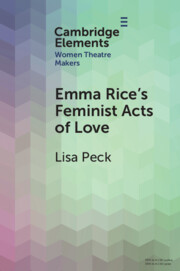Element contents
Emma Rice's Feminist Acts of Love
Published online by Cambridge University Press: 19 June 2023
Summary
- Type
- Element
- Information
- Series: Elements in Women Theatre MakersOnline ISBN: 9781009287234Publisher: Cambridge University PressPrint publication: 13 July 2023
References
- 3
- Cited by



